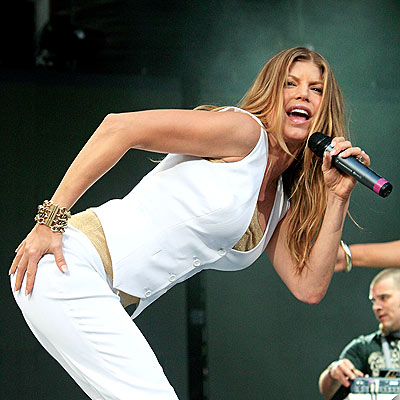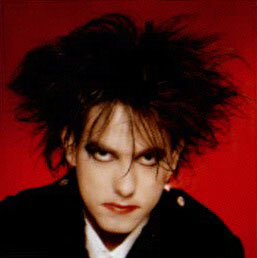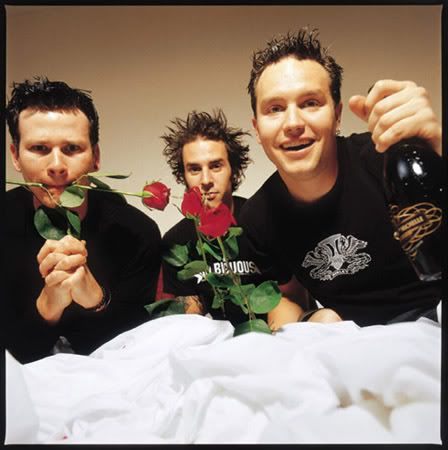 After leaving the claustrophobic basement atmosphere in Soho and the dense weave of Robert Smith's hair in Crawley, England, we travel north to upscale Leeds to take a breather for the weekend, and we sip some tea in a bar by the roadside, and we let our hair down while we can, and we hear Bob Marley’s three little birds telling us to put Corinne Bailey Rae’s record on, the one with the pop/soul musical atmosphere (complete with horns and acoustic guitar) that’s as pleasant and airy and refreshing and sweet as the cinnamon in the air, and it’s the unadorned joy in Rae’s voice (and the cute little details, as minute and apt and accurate as those found in country music lyrics) that lifts us above the doldrums and reminds us that music need not be cynical and morose to be honest and true.
After leaving the claustrophobic basement atmosphere in Soho and the dense weave of Robert Smith's hair in Crawley, England, we travel north to upscale Leeds to take a breather for the weekend, and we sip some tea in a bar by the roadside, and we let our hair down while we can, and we hear Bob Marley’s three little birds telling us to put Corinne Bailey Rae’s record on, the one with the pop/soul musical atmosphere (complete with horns and acoustic guitar) that’s as pleasant and airy and refreshing and sweet as the cinnamon in the air, and it’s the unadorned joy in Rae’s voice (and the cute little details, as minute and apt and accurate as those found in country music lyrics) that lifts us above the doldrums and reminds us that music need not be cynical and morose to be honest and true.Friday, April 3, 2009
The 333 Best Pop Songs of the 2000s: #144
 After leaving the claustrophobic basement atmosphere in Soho and the dense weave of Robert Smith's hair in Crawley, England, we travel north to upscale Leeds to take a breather for the weekend, and we sip some tea in a bar by the roadside, and we let our hair down while we can, and we hear Bob Marley’s three little birds telling us to put Corinne Bailey Rae’s record on, the one with the pop/soul musical atmosphere (complete with horns and acoustic guitar) that’s as pleasant and airy and refreshing and sweet as the cinnamon in the air, and it’s the unadorned joy in Rae’s voice (and the cute little details, as minute and apt and accurate as those found in country music lyrics) that lifts us above the doldrums and reminds us that music need not be cynical and morose to be honest and true.
After leaving the claustrophobic basement atmosphere in Soho and the dense weave of Robert Smith's hair in Crawley, England, we travel north to upscale Leeds to take a breather for the weekend, and we sip some tea in a bar by the roadside, and we let our hair down while we can, and we hear Bob Marley’s three little birds telling us to put Corinne Bailey Rae’s record on, the one with the pop/soul musical atmosphere (complete with horns and acoustic guitar) that’s as pleasant and airy and refreshing and sweet as the cinnamon in the air, and it’s the unadorned joy in Rae’s voice (and the cute little details, as minute and apt and accurate as those found in country music lyrics) that lifts us above the doldrums and reminds us that music need not be cynical and morose to be honest and true.Thursday, April 2, 2009
The 333 Best Pop Songs of the 2000s: #145
 From Sheffield to Robert Smith's pad at Crawley and now, we'll travel south into London's West End, into the bohemian rhapsody found in the basement of a Soho apartment, where we find Mike Lindsay modeling his electronics and keyboards and samples and found sounds around singer Sam Genders's folksy meanderings. The result of this combination is something to akin to mid-period Pink Floyd...had Floyd guitarist David Gilmour strummed an acoustic for his entire career, and before Floyd singer and songwriter Roger Waters's bombast surplanted all of his wit.
From Sheffield to Robert Smith's pad at Crawley and now, we'll travel south into London's West End, into the bohemian rhapsody found in the basement of a Soho apartment, where we find Mike Lindsay modeling his electronics and keyboards and samples and found sounds around singer Sam Genders's folksy meanderings. The result of this combination is something to akin to mid-period Pink Floyd...had Floyd guitarist David Gilmour strummed an acoustic for his entire career, and before Floyd singer and songwriter Roger Waters's bombast surplanted all of his wit.
Instead of musical bombast, Lindsay turns Genders's cryptic, Orwellian lyrics into a bouncy, haunting, Weillian jaunt during the verses and the choruses. That stark contrast provide the song with an eeriely disquieting mood, one that's set by the strange singing--tribal chant? backmasking? both?--at the beginning (and is reprised near the end). Lindsay's production work here is splendid and inventive and ceaseless, as he drops disparate samples in pocket after pocket, resembling the work of DJ Shadow and the Dust Brothers (and, before them, the electronic/loop work of Terry Riley). His production work doesn't end with the samples, either, as several different atypical percussion instruments are used--some repeatedly, some in just one spot. It's a record constructed to be heard with the headphones, and it demands multiple plays just to be able to decipher all the different sounds, not to even mention what originated all those sounds. The effect is Brechtian (as is the communal sense of the group, as several of Tunng's members were recruited because neither Lindsay nor Genders were comfortable with performing on stage without some accompaniment).
What's also difficult to decipher are the lyrics. Genders's story here stems from an amalgam of symbolist and stream-of-consciousness writing, a mixture of Eliot and Woolf; the meaning is never clear, but the lyrics do have meaning--they're not just nonsense verse. Though the lyrics often use the pronouns "I," "your," "we," "us," and "our," the pervading sense is of a horror universal, of an overall sense of enforced malaise upon society, of a stripping of will and memory, of apathy abounded, of where not only do we not remember what we did--we don't remember why--and we don't care. Tunng use avant-garde pop to give us images of a world in the aftermath of the politics that Johnny Rotten railed against, and they find that Rotten was right, that we're all pretty vacant.
This avant-garde pop Tunng uses--it's very Beatlesesque. It's not derivative of the Beatles, though, at least not in the way most Beatles-influenced bands are deriviative of the Beatles. Lindsay and Genders don't mine the Liverpudlians' pop structures nor vocal harmonies; what they take is Lennon & McCartney's avant-garde expermentalism, the least copied/influenced aspect of the Beatles, the one most in need of further development. Lindsay and Genders do just that: they take the Beatles' (and Terry Riley's and DJ Shadow's) sonic experiments, adapt them into the twenty-first century by using DJ montage (instead of, say, scratch n' sniff) style mixed with the '70s singer-songwriter variety of storytelling, Brechtian/Wellian collage, and fester--at least in this song--black humor and satire of an Orwellian bent to give us something to ponder upon and nod to while the world spins madly on.
Wednesday, April 1, 2009
The 333 Best Pop Songs of the 2000s: #146
was an
April Fool's Day joke
on you
but the people who told me they read it
thought that I was serious
so I guess the joke
was on me
so to erase the musical memory
of Fergie Hung
I'll give you the Cure's Robert Smith
fronting Blink-182
in a song written by Blink-182
that sounds just like a Cure song
in sound and structure
not just the vocals
which is a phenomenal accomplishment
for two reasons
for a band that's never
had any song
sound anything like this
and
for a band that's never
had any song
sound anything like this
to write and record the best Cure song
in a decade
to write and record the best Blink-182 song
in a decade
...
which would be the length of the band's career
...
and
...
Robert Smith wasn't even in the same country
as Blink-182
when he recorded his vocal to the track
...
just thought of a third reason this song is great
:
Blink-182's fantastic drummer Travis Barker
punk style played with the velocity of speed metal
and still not sound too busy
completely dials back
playing Meg White
to Robert Smith's Jack
...
oh snap!
--a fourth reason!
(and the last one
--I think)
Robert Smith has the ability
to take out Mecha Streisand
with one punch
...
so how quickly
do you think
he'll be able
to knock out
Fergie Hung?
PDQ
The 333 Best Pop Songs of the 2000s: APRIL FOOL'S!
 I have a friend who once told me that life--every aspect of it--was all about sex. War, religion, taxes, death, vegetables, space exploration, and every topic I could think of he reduced to its essence, to its origin, to sex. Even music? Especially music he said. To further prove his theory, we scanned the radio, and every song we heard that night--from the likes of "Stairway to Heaven" to "Wind Beneath My Wings" to "A Change Is Gonna Come"--he deconstructed till he unearthed the sexual center of each song. I was aghast at first, but come to find out...he was right. It's all about sex, even music, pop music especially.
I have a friend who once told me that life--every aspect of it--was all about sex. War, religion, taxes, death, vegetables, space exploration, and every topic I could think of he reduced to its essence, to its origin, to sex. Even music? Especially music he said. To further prove his theory, we scanned the radio, and every song we heard that night--from the likes of "Stairway to Heaven" to "Wind Beneath My Wings" to "A Change Is Gonna Come"--he deconstructed till he unearthed the sexual center of each song. I was aghast at first, but come to find out...he was right. It's all about sex, even music, pop music especially.
Tuesday, March 31, 2009
The Tournament of Metal: Round One, Bracket Two
Voting ends on Saturday at midnight, so don't forget to rock the vote!
The 333 Best Pop Songs of the 2000s: #147
 From Wales, we now travel northeast to the steel city of Sheffield, where we find Jarvis Cocker performing his own take of a song he wrote for Nancy Sinatra (who recorded it in 2004). Perhaps the distance created when writing a song for another performer is what makes this record atypical for Cocker.
From Wales, we now travel northeast to the steel city of Sheffield, where we find Jarvis Cocker performing his own take of a song he wrote for Nancy Sinatra (who recorded it in 2004). Perhaps the distance created when writing a song for another performer is what makes this record atypical for Cocker.
The lead singer of the Britpop band Pulp, Cocker typically writes mordant songs of political, personal, sexual, and class conciousness, and in his pen runs ink of hues mixed equally from three noteworthy Johns: Swift, Steinbeck, and Fogerty. Cocker's voice--earnest yet lackadaisical, always just this side of being in tune, never shying away from its Yorkshire accent--reflects his protagonists' typical working-class/loser/slacker roots, and it gives the Pulp records some of their charm.
In this record, Cocker's voice and typical topics take a backseat to the song itself. The song is soul song for the brokenhearted, classic Motown stuff, so good, so perfect a fit for that mileau, that it sounds as if it's a long-lost Smokey Robinson or Holland-Dozier-Holland tune that the Temptations or a young Marvin Gaye might have once recorded. The lyric's of a guy who pines for a girl who's being strung along by a chap who doesn't want to commit to her, a lothario, and the narrator sees right through it. We see right through him, to...thanks to Cocker's vocals.
As noted before, Cocker doesn't possess a traditionally strong voice, but within his limited range, he's very effective. He sings the song at a bit of a distance, as if he's just a friend giving advice, but every so often, at just the right juncture, his voice tightens, his volume raises, and his voice slightly seethes, and we can deduce that his narrator abhors his friend's suitor. Cocker backs off his anger as quickly as he rises to it, as if he--the narrator (and Cocker, too)--has deduced that the woman has already made her decision to stick with the guy, and that he--as her friend, and as the man who secretly loves her, who's truly dedicated to her--is giving his last warning before the girl leaves with her suitor for good, leaving him behind.
There's a strong sense of defeatism here--as is the case with many of Cocker's songs, and it's this sense of defeatism that moves this from a formulaic* soul song of the personal into the realm of universal class consciousness. The narrator knows that he won't be able to move beyond his lot, and that knowledge comes across in Cocker's vocal style: his vocals are distanced because the song's narrator has distanced himself from the situation, afraid from showing his feelings outright because he knows it will do no good. There's only the slightest glimmer of hope, here, and in that glimmer of hope lies the inherent tragedy. The song's both an affirmation of true love and a rejection of the concept all at once. Yeah, Marvin Gaye could have sung it better, but he wouldn't have sung it any truer. Maybe Temptation Jimmy Ruffin could have, though. He knew what became of the brokenhearted. Jarvis Cocker does, too.
NOTES
*Yeah, after listening to hundreds of Motown songs, one starts to see the formula, but hey....what a formula!
Monday, March 30, 2009
The Tournament of Metal: Results for Rd.1, Bracket 1

Okay, folks, first an apology. Somehow, bugs snuck in my blog. I squashed them, but not before they disconnected the Tournament of Metal polls for Round One, Bracket One. Sure, the polls were over, but I had yet to notch the exacting polling numbers, though I did log the victors. Here they are (with the winning songs in red text):
AC/DC
“Hells Bells” v. “Stiff Upper Lip”
“Back in Black” v. “Moneytalks”
“Shoot to Thrill” v. “Thunderstruck”
“You Shook Me All Night Long” v. “Sink the Pink”
“Have a Drink on Me” v. “Who Made Who”
“Rock & Roll Ain’t Noise Pollution” v. “For Those About to Rock”
“Rag Doll” v. “The Other Side”
“Dude Looks Like a Lady” v. “Love in an Elevator”
“Hangman’s Jury” v. “Janie’s Got a Gun”
“Angel” v. “What It Takes”
Accept
“Balls to the Wall” v. “Fast As a Shark”
Anthrax
“Madhouse” v. “I’m the Man”
“Caught in a Mosh” v. Anti-Social”
Armored Saint
“Can You Deliver” v. “Reign of Fire”
Autograph
“Turn Up the Radio” v. “Blondes in “Black Cars”
Bad English
“When I See You Smile” v. “Forget Me Not”
Bang Tango
“Someone Like You” v. “Breaking Up a Heart of Stone”
Black ‘n Blue
“Hold On to 18” v. “I’ll Be There For You”
Bon Jovi
“Bad Medicine” v. “You Give Love a Bad Name”
“Lay Your Hands on Me” v. “Wanted Dead or Alive”
“Runaway” v. “In and Out of Love”
“I’ll Be There for You” v. “Never Say Goodbye”
“Born to Be My Baby” v. “Living on a Prayer”
Britny Fox
“Girlschool” v. “Long Way to Love”
Bulletboys
“Smooth Up in Ya” v. “For the Love of Money”
Cinderella
“Shake Me” v. “Shelter Me”
“Somebody Save Me” v. “Gypsy Road”
“Night Songs” v. “Last Mile”
“Take Me Back” v. “Heartbreak Station”
“Coming Home” v. “Don’t Know What You’ve Got (Till It’s Gone)”
Alice Cooper
“Poison” v. “Feed My Frankenstein”
The Cult
“She Sells Sanctuary” v. “Firewoman”
“Wild Flower” v. “Peace Dog”
“Love Removal Machine” v. “Lil’ Devil”
Damn Yankees
“High Enough” v. “Come Again”
Danger Danger
“Naughty Naughty” v. “Bang Bang”
Dangerous Toys
“Teas’n, Pleas’n” v. “Scared”
Danzig
“Mother” v. “She Rides”
Def Leppard
“Bringing on the Heartbreak” v. “Let’s Get Rocked”
“High and Dry” v. “Rock of Ages”
“Foolin’” v. “Women”
“Photograph” v. “Animal”
“Pour Some Sugar on Me” v. “Armageddon It”
“Hysteria” v. “Love Bites”
Dio
“Holy Diver” v. “Mystery”
“Rainbow in the Dark” v. “The Last in Line”
Dokken
“In My Dreams” v. “Into the Fire”
“Dream Warriors” v. “Alone Again”
Round One, Bracket Two will start later in the day, sometime before 7:00 p.m. CST.
This bracket will contain songs by artists that fall alphabetically E-L.
You'll get to vote on what you think are the best songs of artists such as:
- Europe
- Lita Ford
- Guns N' Roses
- Sammy Hagar
- Billy Idol
- Judas Priest
- Kiss
- L.A. Guns
and many more. So check back in later tonight, look at the sidebar on the right, and vote on your favorite songs by each band. There will be over forty battles this week, and you get to determine the outcome.
So make sure and bookmark this page and get your one way ticket to midnight.
We call it heavy metal.
The 333 Best Pop Songs of the 2000s: #148
 The British Invasion starts today*, folks, and Welsh singer Duffy leads the way with this neo-soul/disco smash. It's not all new, though: the structure hails from sixties' girl-group singles, the music's staightened-out and glossed-up reggaeton, that synth line seems mighty similar to Danny Red's "Rolling Stone Girl," and the bass riff takes the same from "Stand by Me" and speeds it up. What's new, then? Duffy's retro vocal style, that's what.
The British Invasion starts today*, folks, and Welsh singer Duffy leads the way with this neo-soul/disco smash. It's not all new, though: the structure hails from sixties' girl-group singles, the music's staightened-out and glossed-up reggaeton, that synth line seems mighty similar to Danny Red's "Rolling Stone Girl," and the bass riff takes the same from "Stand by Me" and speeds it up. What's new, then? Duffy's retro vocal style, that's what.
Give this song to most any current (American)** female pop singer, and you'll hear--for better or for worse--singing that doesn't vary greatly in dynamics from verse to chorus. Give this song to Duffy, and she eases back during the verses, cutting down on her wailing and pinching her lines, all of which leave plenty of space for the lyrics to connect and the beat to hit and the background vocals to accentuate the rhythm. The chorus then arrives, and she still holds back, and doesn't finally let loose until the end of it. And when she finally does release her passion, it has impact.
Duffy's vocals are precise (even if her voice isn't crystal clear), and her techniques intelligent, and though I'm sure all her talent comes naturally, it seems to hew from the Atlantic, Stax/Volt, and Phil Spector schools of singing, where in-verse dynamics and drama are brought about through tension and release. Singers like Aretha Franklin and Mavis Staples and Darlene Love were experts at this type of soul singing*** (which derived from a mixture of gospel's call-and-response and Tin Pan Alley-style pop/jazz effeciency), and Duffy's well on her way. She even adds her own stylization to the mix by adding that quick-little rap near the end of the song, the one that runs right underneath the mix, as it's more about riding the rhythm than it is about enunciating the lyrics. In this Duffy shows her soul smarts, as she does by waiting until the very last moment to cry for mercy, just when she--and the song--really need it. The rest is form metting function, the vocal and the instrumental matching the lyric...paradoxically so, though, as when Duffy finally cries out for release is just when we never want to let her go.
NOTES
*Actually, on this chart, the British Invasion began way back with Teddy Thompson at number 319, but who's counting?****
**British too, in a way, for even the fabulous Amy Winehouse doesn't have the sense of vocal dynamics that Duffy does.
***Motown's female singing style was two-fold: one was similar to this Atlantic/Stax/Volt/Spector model, but the Motown singers who followed this model usually didn't have the vocal chops to belt it out; the second was similar to most of today's styles, in which Motown let its strongest singers (like Martha Reeves) shout their lungs out on every line.
****Apparently, I am.










